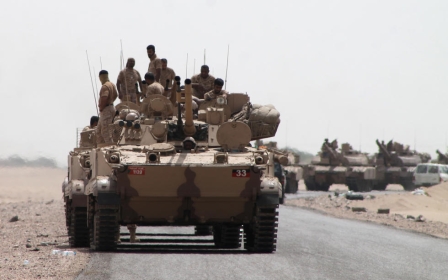Houthis admit setbacks in southern Yemen

MUKALLA, Yemen - Leaders of the Houthi rebel movement battling pro-government forces in southern Yemen have admitted that the intervention of a Saudi Arabia-led international coalition has forced them into retreat.
Saudi-backed forces loyal to Yemen’s exiled president Abd Rabbuh Mansour Hadi have turned the tables on Houthi militia fighters in recent weeks after months of reverses by reclaiming control of the strategic port city of Aden and a military base in Khour Maksar.
Seeking to explain the loss of Aden in a televised speech earlier this month, the Houthi leader Abdul Malik al-Houthi said that his forces had been weakened when the attack came during the Eid holiday as fighters were spending the holiday with their families.
“There was a degree of leniency in Aden during the last days of Ramadan and the advent of Eid as some members of the popular committees and the army took a break to visit their families,” said al-Houthi.
He also attributed the setbacks in Aden to the intensity of air raids on his forces and “collaborative efforts” between the Saudis, the US, the UAE and Israel, but said the attacks had not undermined the “resilience” of the Yemenis and vowed not to bow down.
The Houthis took unprecedented prominence in September when they overran key government institutes in the Yemeni capital Sanaa, including the presidential palace, and later gained effective control of several provinces in the south.
Hadi and other members of the government fled to Aden but were forced into exile in Saudi Arabia in February.
But Houthi fighters have endured weeks of attacks by heavily armed forces backed by aggressive airstrikes, pushing them out of the provinces of Aden, Dhale and Lahj in the restive south with the loss of control of the important al-Anad military base.
Mohammed al-Bukhiti, a spokesperson for the movement, told Middle East Eye that rebel fighters were only equipped to effectively fight lightly armed al-Qaeda, Islamic State group or pro-Hadi militia fighters, rather than the “heavily armed” coalition forces.
“There were not equipped to fight an external invasion. So it is natural that they pull out of their positions to hit back again,” said al-Bukhiti.
However, the Houthis have continued losing out in the south despite their assurances that they are regrouping to fight back.
On Sunday, anti-Houthi military officers told MEE that they had recaptured most of the southern province of Abyan.
Fighting has now moved to the outskirts of the city of Lawder, the last area under the rebels’ control in the province.
Saudi 'invasion'
Al-Bukhiti described reports of the arrival of soldiers from Saudi Arabia, the UAE and Egypt on Yemeni soil as an “invasion” that would provoke Yemenis into joining the Houthis’ popular committees to drive them out of the country.
A spokesperson for the Yemeni Ministry of Defence told MEE on Thursday that coalition ground forces had entered the fray, although a senior Egyptian military official subsequently denied Egyptian involvement.
But Major General Ahmed Saif al-Yafae, the commander of Aden’s 4th military district, who led the battles against the Houthis in the south, said that the reason for the pro-Hadi forces’ advances was the bravery of those resisting Houthi rule.
“People had no other choice but to fight Houthis who stormed their houses and displaced them,” al-Yafae told MEE by telephone from Aden.
Al-Yafae also gave some credit to the coalition air forces for turning the tables in the conflict.
“The airstrikes have crippled the firepower of the Houthis that include cannons and rockets. They’ve also prevented the Houthis from bombing our forces,” he said.
Since day one of their military operations in the south, many observers have predicted that the Shia movement would trigger armed opposition to their presence since the south is predominately Sunni and a stronghold of separatists calling for the breakup of the country.
“It is true that we do not have much support in the south like some areas in the north, but we moved into the south for self-defence. When Hadi fled to Aden, he threatened to raise the Yemeni flag on Marran mountain in Saada [the Houthis’ stronghold],” said Al-Bukhiti.
Al-Bukhiti accused Hadi of betraying his country by asking for foreign intervention and also accused him of colluding with al-Qaeda and IS. Yemen has long been a stronghold of the al-Qaeda in the Arabian Peninsular group, while IS claimed responsibility for two suicide attacks targeting mosques in the Yemeni capital that killed scores of people.
“We also aimed at fighting al-Qaeda and IS elements in the south that were responsible for explosions inside mosques in Sanaa,” he said.
Stay informed with MEE's newsletters
Sign up to get the latest alerts, insights and analysis, starting with Turkey Unpacked
Middle East Eye delivers independent and unrivalled coverage and analysis of the Middle East, North Africa and beyond. To learn more about republishing this content and the associated fees, please fill out this form. More about MEE can be found here.




